Crops damage caused by monkeys is a grave concern. Monkeys love a wide range of food that includes roots, shoots, leaves, fruits, and even grasses. Monkeys also cause significant damage to fruit crops such as Mango, Guava, Grape, Citrus Fruit, Lychee, Pear, Peach, Plum, Apricot, etc., in large areas of the state, causing great loss to farmers. Let’s check out how to keep monkeys away from plants, vegetables, fruits.
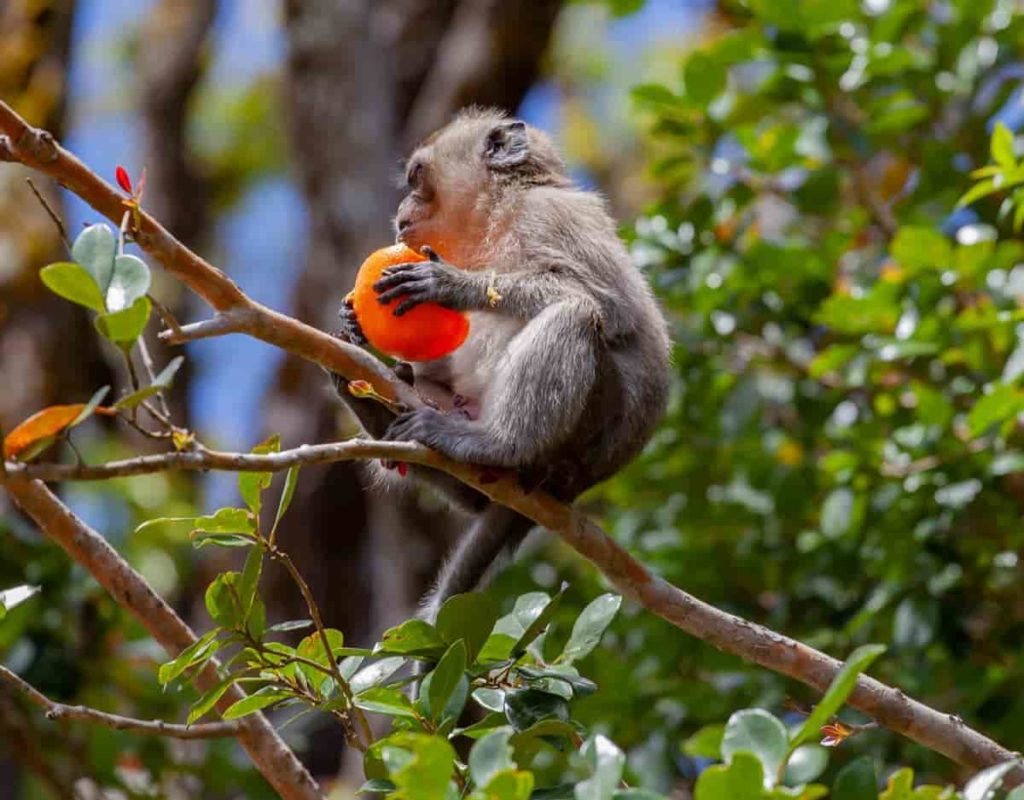
It has been observed that the incidence rate is higher in the morning and evening. In addition, the migration of monkeys has reduced the spread of wild plant seeds in the forest area, which may endanger some species of wild plants. Even monkeys cannot be killed for religious reasons. Technical interventions for controlling monkeys are the installation of a solar fence, monkey repellent, monkey scare guns, laser-guided alarms, etc., around the field. Root crops, Ginger, Turmeric, Colocasia, Aloe vera, Yam, Marigold, Lime, Lemon, Lemongrass, Lavender, etc., are the crops that have not been damaged by monkeys.
In this article, we are discussing;
- How to protect your garden crop from monkeys
- Tricks to be used to keep the monkeys away from vegetable plants, fruit trees, and other grain crops
- Keeping away monkeys with natural repellents
Identify the problem
- Monkeys eat corn and many other crops which cause a lot of damage.
- Monkeys damage crops in many areas;
Ramesh Verma is a retired animal husbandry official who now farms in Chaukha village. Monkeys destroyed her entire corn orchard last year. He invested Rs 50,000 to plant maize on the 1.2-hectare farm. The monkeys destroyed it.
According to the National Institute of Disaster Management, Himachal Pradesh loses Rs 500 crore annually to agricultural production due to wild animals including monkeys. The figure is higher than what the state spends on agriculture every year. The state budget for agriculture for 2015-16 is Rs 450 crore.
Himachal Pradesh is an example of how bad the situation is in the country. From Jammu and Kashmir in the north to Karnataka in the south, several states of the country are struggling to control monkey attacks. Jammu and Kashmir agriculture minister, G H Mir, issued a statement saying that 250 villages in Jammu are losing Rs. 33 crores in agricultural production every year due to attacks by wild monkeys.
The story of Uttarakhand is so bad that the villagers choose to sell their crops instead of growing crops. One such village in Dehradun district is Fulsaini, where about 50 percent of arable land has become barren due to the destruction of wild animals such as monkeys. Amit Kala says most of the land that is still under cultivation is owned by a Delhi farm developer because many residents sold their fields at throwaway prices after monkeys invaded their fields.
In Karnataka, monkeys lost Rs 5 crore worth of crops to farmers in 2010, according to the state agriculture department. According to media reports, crop losses due to monkeys in the state have increased in the last five years, although no official data is available. However, state forest department figures show that about 800 small farmers in Karkala taluka near Mangalore had given up farming in 2012 after monkeys destroyed 75 percent of the area’s crops. As a result, more than 57 hectares of fertile land lies fallow in the taluka. Traditionally, farmers believe that about 10% of the products will be destroyed by wild animals.
In case you miss this: Protecting Crops From Animals And Birds – Ideas, Tips
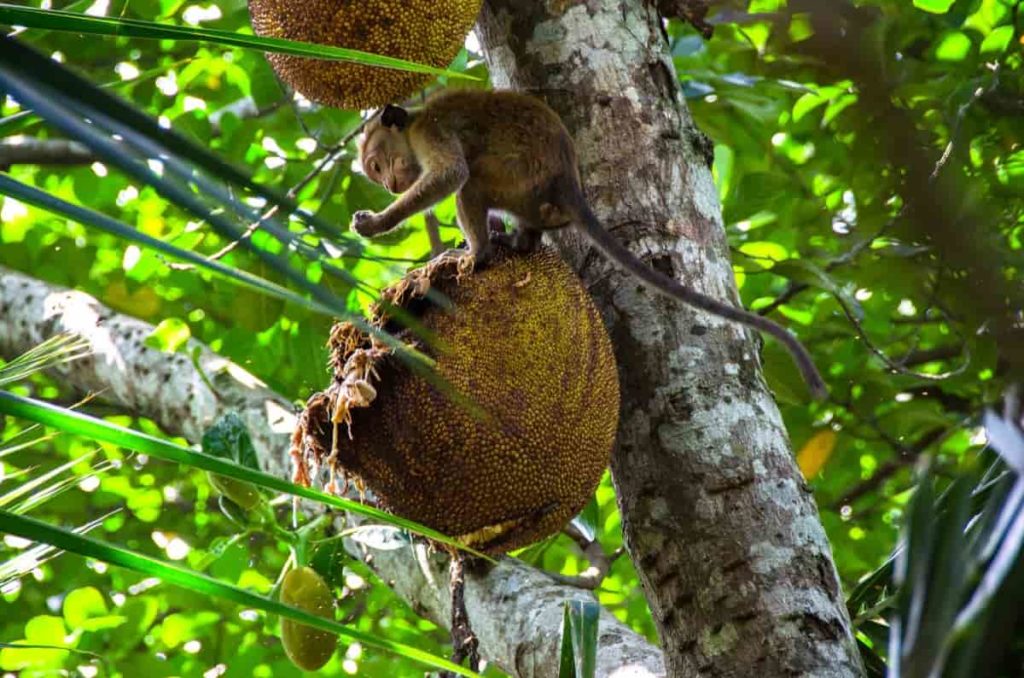
How to keep monkeys away from garden plants, vegetables, fruits?
Use secured bins
This is most likely that monkeys will be attracted to crops if they think they can easily access food. Before you think about installing an alarm or safety device to repel monkeys you make sure you are not encouraging them to enter your neighborhood. The first step is to check that there are no open or insufficiently secure bins that monkeys can easily access.
Use monkey-proof bins that can be secured properly and will not attract monkeys. You can secure the bin lids with a flexible strap or bungee cord. All trash bags tie a double knot and make sure no food waste is lying around, or spilling out of the bins.
Natural repellents
Some farmers prefer natural protection measures over mechanical or chemical protection methods. Chilli pepper is the chemical Capsaicin that makes chili peppers hot. It is an excellent repellent against elephants, monkeys, squirrels, and some other wild animals. Pepper farmers will also benefit from additional sources of income.
Sprinkling the vegetables with pepper prevents the monkeys from eating them. The chemical Capsaicin in pepper is an excellent disinfectant against monkeys, squirrels, and some other wild animals. Pepper farmers will also benefit from additional sources of income.
In most farmland areas, farmers protect their fields with sticks and use trained dogs to repel monkeys from their fields. To protect crops, farmers deploy laborers to protect crops. The deployment of laborers to crop protection from monkeys does not always guarantee 100% protection due to difficult terrain and human limitations of working in adverse weather and night hours. Farmers also use firecrackers and gunfire to drive away monkeys / wild animals.
Use of dry fish as a repellant
Some farmers hang dry fish on branches / keep small packets sealed with pieces of dried fish without bones around the field. When the packet is opened, the monkeys rub their hands to get rid of the stench until it bleeds. Then, they never enter the same field with their team.
In case you miss this: Top 50 Fish Farming Tips, Ideas, and Techniques
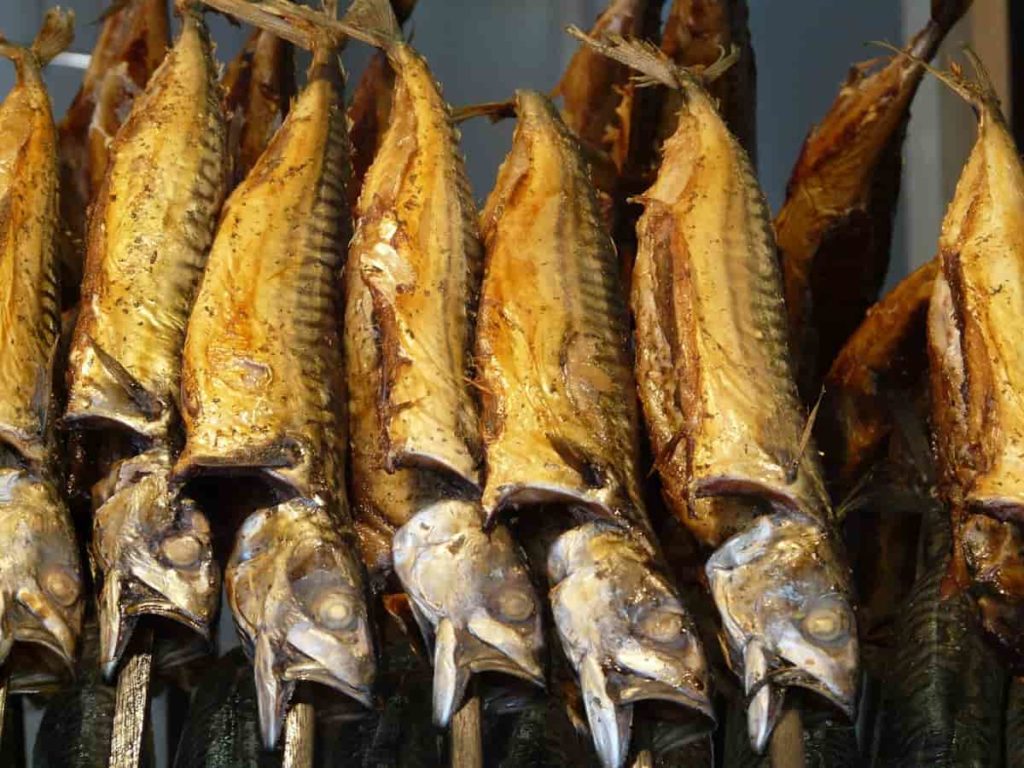
Use chili powder rice balls
Around the field use Boiled rice, crushed groundnut seeds, red chili powder, and coconut oil for preventing crops from monkeys. Then, monkeys feel the burning of tongue and thirstiness on tasting the rice balls, due to which monkeys will avoid the area. Water should not be available in the surrounding areas.
Smoke
Burn dung (with chili for more effectiveness) or other substances that emit smoke and produce heavy smoke. Farmers burn sticks dipped in phenol to keep monkeys away from the field.
Toy snakes
Keep/hang some colorful rubber snakes in vulnerable places. Keep changing the position of toy snakes. It helps for a while until an intelligent monkey finds out the truth. In Karnataka, a farmer discovered a unique method to protect his field by painting his dog as a lion to repel monkeys, claiming that his farm would not be attacked by monkeys again because monkeys were afraid of and avoided unfamiliar species.
In case you miss this: Solar Power Fencing for Crop Protection, Design, Installation, and Advantages
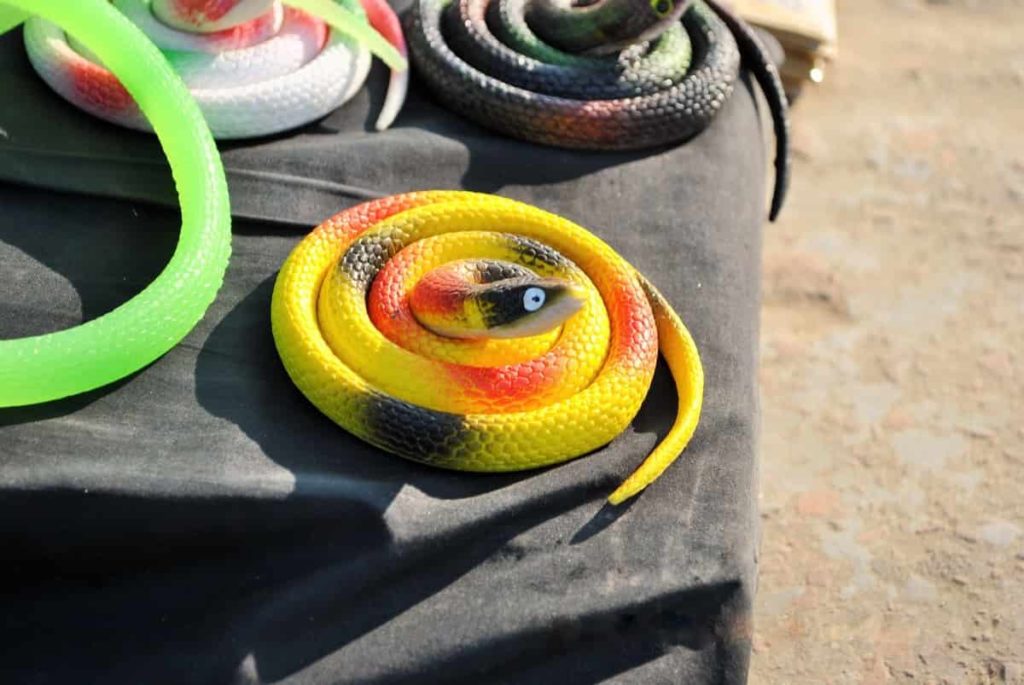
Whip rope sound / Shrill noise
Monkeys hate shrill noise. Collect, edit and transmit approximately 100 sound clips from the Internet, such as Lion, Tiger, Langur, and transfer them to a pen drive and play the sounds of these predators on an audio device that can be fixed on any tree and play for 6 hours/day where monkey menace is at its peak. Keep changing the files so that the monkeys do not use them. In rural Jammu, farmers use three-band tapering rope to fire a gun to scare away wild animals and birds.
Monkey trap
The trap consists of a hollowed-out coconut, which is tied at stake. Inside the coconut is some rice/banana which can be caught by a small hole. The monkey’s hand fits into the hole. But its closed fist can’t come back. The monkey is suddenly trapped. A terrified monkey avoids coming to the area again.
Cultivation of medicinal and aromatic plants
Farmers can now check the losses caused by these primates on fields by adopting the farming of Medicinal or herbal and Aromatic plants in areas affected. Many types of medicinal plants including Sarpgandha, Ashwagandha, Brahmi, Kalmegh, Shatavari, Tulsi, Aloe vera, Artimisiaetc are not liked by monkeys and the major benefit of practicing farming of herbal plants is that monkeys do not eat them.
In case you miss this: Growing Tulsi Organically – Cultivation, Farming
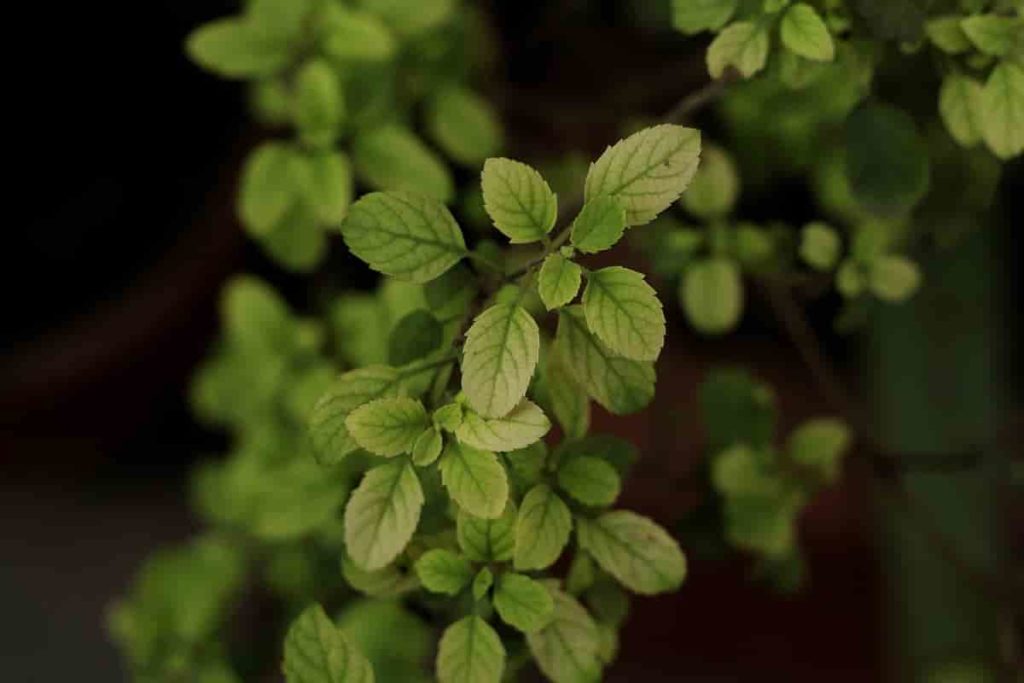
In addition, it also increases the productivity of the soil which increases the yield of the next crop on this land. herbal plants are used for preparing medicines, so there is already an established market for their production. Similarly, aromatic plants such as Lavender, Citronella, Geranium, Pamarosa, etc., can also be grown to protect against this danger.
Natural predators
The use of natural enemies needs to be promoted. The langur is the natural enemy of monkeys and even a langur scares a large group of monkeys. For controlled breeding of langurs, the Forest Department, in collaboration with SKUAST-Jammu launch a program so they can be trained and used as pets or left in nature in problem areas.
Different ways to control monkeys from garden damage
There are several ways to control monkeys like trapping, scaring, hunting, slings, and stones. The best way to trap them is to build several bridges to the farm. Make long stick bridges in the fork of the branch sticks. Sat the trap in the fork of the branched stick. Attracted by the crops in the field, the monkeys use the bridge to enter the field and one of them gets trapped.
The bridge is made of sticks. Make a trap over the tree using sticks, wires, and palm fronds. Make a small path and block the other edges. Lay a trap in this regard. The monkey tries to cross the path and gets trapped. Put pepper or tobacco dust on the ears of the corn in an attractive place in the field. When the monkey tries to pull the ear, it will get pepper or dust in its eyes.
Farmer uses the internet to keep monkeys
A farmer from Belthangady has developed a novel device, Gajnana Vaze, 51, a farmer from Mundaje using knowledge from the internet to protect crops from monkeys. They have managed to keep the monkeys away, thus protecting their field. Vaze has succeeded in developing a monkey extractor to keep simians away from the knowledge gained from the internet. It has done a great job on my farm.
Monkeys destroying saplings and fruits is a long-standing problem in Bantwal, Belthangady, Puttur, and Sullia areas of the Dakshina Kannada district. They enter the plantations in groups of 20-25 and have a field day. Every farmer finds ways and means to get rid of them, but most of the methods seem to work only temporarily. Vaze grows Arecanut, Peppers, Bananas, and Cocoa on his farm, where monkeys were creaking havoc and destroying raw Cocoa and Banana plants.
In case you miss this: Cheap Farm Fence Ideas: DIY, Inexpensive, Low-cost, and Budget Tips
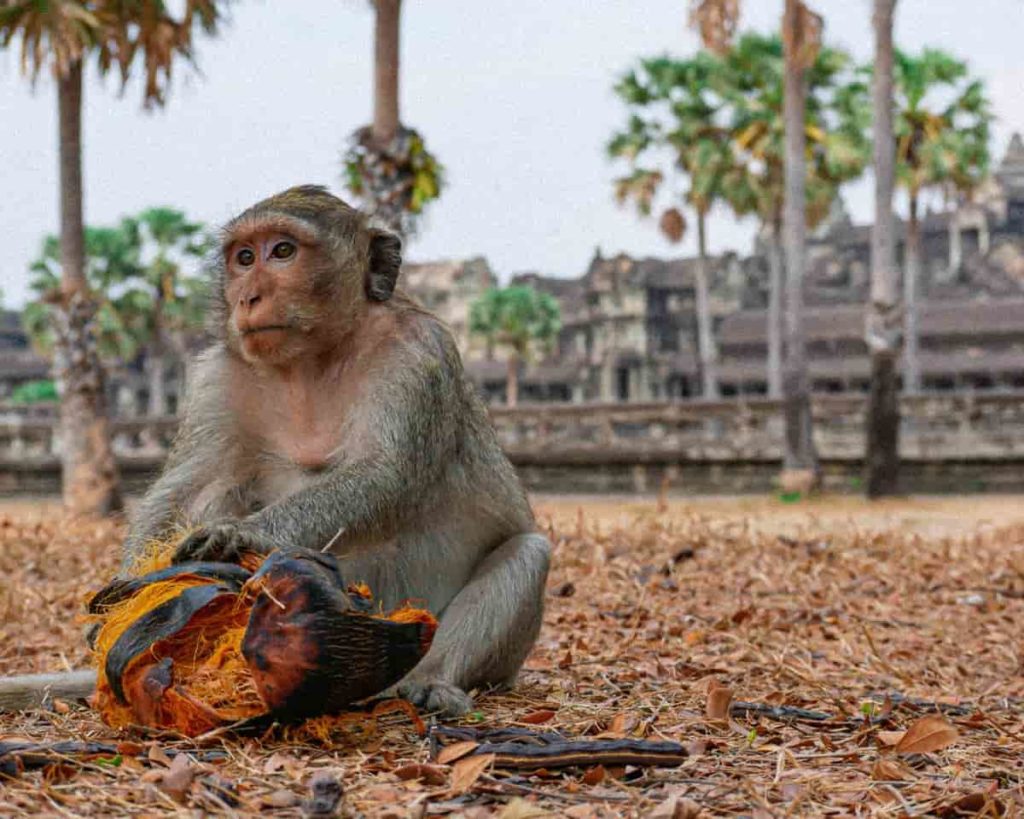
This is an easy way. Monkeys hate loud noises. A collection of about 100 such sound clips, edited them through application software, and transferred them to a pen drive. Bought an audio device that runs on a mobile phone battery and then mounted it on a cocoa tree. It comes with a pen drive. During this season, when the monkey threat is at its peak, play this instrument for about six hours a day. By doing so, able to protect crops to a great extent.
Because of 100 such sounds, there are clips, a section of about 15 files, play 10-15 days. Keep changing files so that monkeys don’t get used to it, it’s terrible on the ears, but the protection of my crops is very important.
Chemical repellents
Keep monkeys away from crops, some active substances like Anthraquinone, Butanethiol, and Methyl Anthranilate can be used. In the border area, the monkeys will be repelling away by mixing 10 grams of Thimet granules with 2 grams of sand kept in a perforated poly bag.
Chemical signals play an important role in animal behavior, and studies have shown that predatory urine repels monkeys. Animal repellent Ricinoleci acid is effective for 20-30 days (Price 800 / Lt). In a bucket, mix 500 ml of Neelbo in 2.5 liters of water and soak the recommended jute/coir rope (1.5 ft x 1.0). ft) In the mixture. Tie ropes around the field. Repeat the above process once every 3 to 4 weeks. High levels of phytoestrogens (soybeans and cluster beans) cause infertility in monkeys.
Ultrasonic monkey repellent with aluminum body
The ultrasonic bat repellent gets rid of monkeys by constantly emitting ultrasonic sound waves. Bat control is best solved with a physical barrier or an ultrasonic pest control device. Their eyesight is not very good and they use echolocation. For this reason, ultrasonic beat repellent devices are the easiest and most effective way to get rid of monkeys.
Monkey scarer device
- It protects crops from monkeys and birds
- Its cost is approximately ₹ 4,040
- Eco-friendly and harmless (As per Indian Wildlife Protection Act1972 act we should not harm any animals)
- Sound will cover an area of 2 to 3 acres of land.
- Reduction in labor cost, crop protection & enhanced income to the farmer.
Few tricks to keep monkeys away from your farm
- In Tamil Nadu, farmers use second-hand fishing nets as fences. They are not expensive; they look like metal and therefore prevent both boar and gaur. They buy fishnets at Rs 80 per kg in Guadalupe. Monkeys stay away because they are afraid of getting caught.
- Rotten eggs, mixed with water, also work in some areas. Some people burn sticks dipped in the phenyl.
- Even sprinkling vegetables with pepper will stop the monkeys from eating.
- The use of mulch between vegetables, which includes straw and small pieces of wood bark, not only controls the temperature of the soil but also prevents animals that do not like to walking on it.
- Types of Pesticides Used in Agriculture: A Beginner’s Guide
- Economical Aquaculture: A Guide to Low-Budget Fish Farming
- 15 Common Planting Errors That Can Doom Your Fruit Trees
- How to Make Houseplants Bushy: Effective Tips and Ideas
- Innovative Strategies for Boosting Coconut Pollination and Yield
- Pollination Strategies for Maximum Pumpkin Yield
- The Complete Guide to Chicken Fattening: Strategies for Maximum Growth
- Natural Solutions for Tulip Problems: 100% Effective Remedies for Leaf and Bulb-Related Issues
- Revolutionizing Citrus Preservation: Towards a Healthier, Greener Future
- Natural Solutions for Peony Leaf and Flower Problems: 100% Effective Remedies
- Maximizing Profits with Avocado Contract Farming in India: A Comprehensive Guide
- Natural Solutions for Hydrangea Problems: 100% Effective Remedies for Leaf and Flowers
- The Ultimate Guide to Choosing the Perfect Foliage Friend: Bringing Life Indoors
- From Sunlight to Sustainability: 15 Ways to Use Solar Technology in Agriculture
- The Ultimate Guide to Dong Tao Chicken: Exploring from History to Raising
- The Eco-Friendly Makeover: How to Convert Your Unused Swimming Pool into a Fish Pond
- Mastering the Art of Delaware Chicken Farming: Essentials for Healthy Backyard Flocks
- 20 Best Homemade Fertilizers for Money Plant: DIY Recipes and Application Methods
- How to Craft a Comprehensive Free-Range Chicken Farming Business Plan
- Brighten Your Flock: Raising Easter Egger Chickens for Beauty and Bounty
- How to Optimize Your Poultry Egg Farm Business Plan with These Strategies
- Subsidy for Spirulina Cultivation: How Indian Government Schemes Encouraging Spirulina Farmers
- Ultimate Guide to Raising Dominique Chickens: Breeding, Feeding, Egg-Production, and Care
- Mastering the Art of Raising Jersey Giant Chickens: Care, Feeding, and More
- Ultimate Guide to Raising Legbar Chickens: Breeding, Farming Practices, Diet, Egg-Production
- How to Raise Welsummer Chickens: A Comprehensive Guide for Beginners
- How to Protect Indoor Plants in Winter: A Comprehensive Guide
- Ultimate Guide to Grow Bag Gardening: Tips, Tricks, and Planting Ideas for Urban Gardeners
- Guide to Lotus Cultivation: How to Propagate, Plant, Grow, Care, Cost, and Profit
- Agriculture Drone Subsidy Scheme: Government Kisan Subsidy, License, and How to Apply Online
- Ultimate Guide to Raising Araucana Chickens: Breed Profile, Farming Economics, Diet, and Care
- Bringing Hydroponics to Classroom: Importance, Benefits of Learning for School Students
- Ultimate Guide to Raising Polish Chickens: Breed Profile, Farming Economics, Diet, and Care
- Ultimate Guide to Raising Australorp Chickens: Profile, Farming Economics, Egg Production, Diet, and Care
- Silkie Chicken Farming: Raising Practices, Varieties, Egg Production, Diet, and Care
- Sussex Chicken Farming: Raising Practices, Varieties, Egg Production, Diet and Care
I have tried to protect the mangoes in my tree from monkeys by spraying the fruits when they are small with a mixture of country liquor with water 1/3 bottle in about 3 litres of water is to be sprayed after 2 week intervals .I found it to be very effective in keeping the monkeys at bay because it seems they hate the smell of liquor !
I have used Monkey Out gel for controlling monkeys as repellent spray on vegetable. I got perfect results upto harvesting. The same I used in bait as mixing with food snacks gave results for 30-49 days. Monkey stayed away from eating and making movements near to bait
Very useful information.
How to prevent Monkeys menance in Konkan Region of Maharashtra ?
They destroy crops, vegetables plantations, various fruits plantations.
How to protect hanging electric or cable wires from monkey as they bite them and hang on them